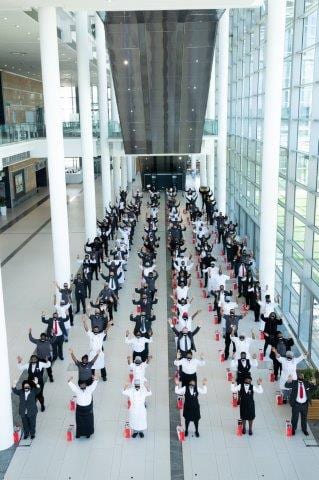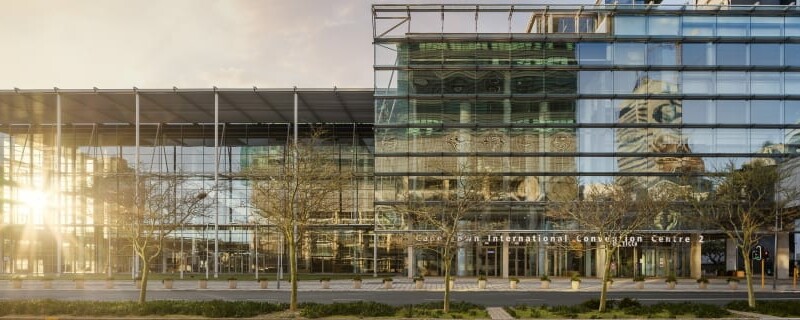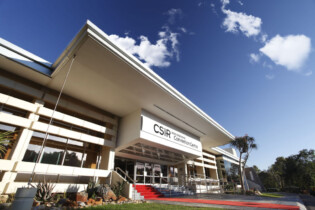The Cape Town International Convention Centre (CTICC) recently held its 2019/20 Annual General Meeting (AGM), which gave some insights into how the venue has adapted to the Covid-19 pandemic and its impact on the events industry.
 During the AGM, Taubie Motlhabane (pictured), CTICC CEO, reported, “2020 was an unusual year; but like a chameleon responding to its changing environment, the CTICC adapted to the challenges presented by Covid-19. We did this by pivoting our business practices, transforming operations and reigniting our passion for innovation. And with the support of our various partners, we are cautiously optimistic. We are all going through a very tough time, but we are hopeful that brighter days are coming.”
During the AGM, Taubie Motlhabane (pictured), CTICC CEO, reported, “2020 was an unusual year; but like a chameleon responding to its changing environment, the CTICC adapted to the challenges presented by Covid-19. We did this by pivoting our business practices, transforming operations and reigniting our passion for innovation. And with the support of our various partners, we are cautiously optimistic. We are all going through a very tough time, but we are hopeful that brighter days are coming.”
The financial report shows that the company was on track to achieve a target revenue of R285 million when lockdown level 5 was initiated. This resulted in an almost R65m loss, 23% below the initial target.
An Earnings Before Interest, Taxes, Depreciation, and Amortization (EBITDA) loss of R23.6m was subsequently anticipated, which Motlhabane and her team managed to reduce to only to R12.5m.
The CTICC’s cumulative economic contribution to the Western Cape Province was R44.5bn, and to South Africa’s national GDP was R5.5bn.
Despite the negative effects of the pandemic, the CTICC was still able to make many noteworthy achievements in the period reported on:
- From July 2019 to March 2020, it hosted 397 events, including 34 international conferences. This figure was the same as the previous year, despite three and a half months of no activity.
- The events it hosted included AfricaCom 2019, an international event attracting 11 527 delegates; Cape Homemakers Expo 2019, a local event which drew 26 686 visitors; and numerous new shows including the Korean Consumer Showcase, the Asian Racing Conference and the Doha Debates.
- The CTICC also hosted its own events: its inaugural Gift Fair saw close to 3 000 visitors through the doors in November 2019, and the AllSport Expo which was due to take place in September 2020 but which the company adapted to instead present digital AllSport coaching workshops in October and November 2020.
- It donated space to Ladles of Love for 60 days to store, prepare and distribute food to some of Cape Town’s most vulnerable communities. In this time, the non-profit organisation was able to deliver nearly 2.6 million meals.
- In line with its sustainability focus, the CTICC diverted 71% of its waste from landfill, reduced municipal water consumption by 33.1% and decreased its energy consumption by nearly 5% compared to the previous financial year.
- The CTICC’s cumulative economic contribution to the Western Cape Province was R44.5bn, and to South Africa’s national GDP was R5.5bn.
- It created more than 11 000 jobs nationally. This means the venue has created a total of 142 326 jobs since it opened in 2003.
- 87.5% of the company’s total procurement spend was with locally-based service partners, 86% was with B-BBEE service partners, and 42% of the total service partner base were women-owned enterprises (a 3% increase on the previous financial year).
 Motlhabane also drew special attention to one of her proudest achievements since lockdown: the hosting of the temporary Covid-19 Hospital of Hope. The 862-bed hospital was based in CTICC 1, where more than 1 500 patients were cared for in the 11 weeks it was open. During this time, the venue provided operational support, WiFi and security, while its kitchens prepared up to six meals a day for patients, catering for a range of dietary needs and specialised requirements.
Motlhabane also drew special attention to one of her proudest achievements since lockdown: the hosting of the temporary Covid-19 Hospital of Hope. The 862-bed hospital was based in CTICC 1, where more than 1 500 patients were cared for in the 11 weeks it was open. During this time, the venue provided operational support, WiFi and security, while its kitchens prepared up to six meals a day for patients, catering for a range of dietary needs and specialised requirements.
“At these times, supporting our communities has become an important expression of the CTICC’s triple-bottom-line commitment to people, planet and profit,” writes Deon Cloete, CTICC Board Chairperson, in his Foreword to the 2019/20 Integrated Annual Report. These initiatives increased the CTICC’s CSR contribution by 340% during this period – to a total of R5.5m.
“We have had to adapt quickly and continuously. The future dictates that we continue to be agile and flexible, if we are going to thrive.”
The venue has adapted to the country’s new health and safety measures, and has successfully implemented remote working while offering virtual walk-throughs and a range of new hybrid and digital event options for its clients.
“It has been almost a year since Covid-19 started disrupting our economy. The CTICC, like many other organisations, has been impacted by this global pandemic. We have had to adapt quickly and continuously. The future dictates that we continue to be agile and flexible, if we are going to thrive,” said Motlhabane.
“Our priority now is to get the CTICC back to full operational activity so that we can continue to contribute to South Africa’s GDP and the Western Cape’s GGP. We will focus on finding new ways of doing business and continue to innovate in the event space. We have hope and we will work hard to ensure that our hope becomes reality.”
For the CTICC’s full report, click here.
READ: TBCSA releases findings on the impact of Covid-19 on the tourism sector







